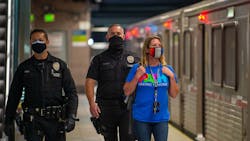L.A. Metro helping more unhoused people get into shelters during COVID-19
The Los Angeles County Metropolitan Transportation Authority (L.A. Metro) has implemented several new public safety-related education and outreach efforts to help ensure the system is primarily used for essential travel.
One of the new measures L.A. Metro has taken on is Operation Shelter the Unsheltered. L.A. Metro offers bus transportation to unhoused and other vulnerable individuals to those who, for their own safety and those of other transit riders, may need social service assessment, shelter or mental health services.
Since this service began on April 1, more than 290 unhoused individuals riding the L.A. Metro system have accepted bus transportation to nearby shelter beds, an increase compared to the agency’s normal outreach rate for homeless housing services. In January 2020, for example, the agency attained interim housing for 46 individuals. Sixteen were permanently housed.
Bob Green, L.A. Metro’s chief of system security and law enforcement, says the increase is due in part to the availability of new beds at nearby city recreation centers. The increase is also due to the agency’s internal teamwork and close coordination with the city of Los Angeles’s Unified Homeless Response Center. This center, established two years ago by L.A. Mayor Eric Garcetti, acts as a central command post to tackle the city’s homeless crisis in real-time. L.A. Metro has assigned two full-time employees to the resource center to help find available housing near key transit hubs on a real-time basis every day.
“The idea is to be able to offer unhoused individuals space in a shelter while they’re at our stations,” Green said. “We’re seeing some of the unhoused more willing to accept space in the shelters because of the COVID-19 crisis.”
Green cites L.A. Metro’s efforts to educate riders on essential travel, which includes making trips only for those needing to provide essential services, grocery shopping, attending medical visits and the like as the genesis for the agency’s elevated focus in providing housing services to the homeless.
“Ultimately, the goal is to keep our transit system running during the COVID-19 crisis so that we can provide rides to those who need it most,” Green said.
He emphasized that during agency assessments to educate riders about the importance of limiting travel to essential trips, no group is targeted, and no one is forced to go into a shelter against their will.
“This is purely voluntary,” he said. “Unfortunately, there is a small percentage of the unhoused population that are in cognitive crisis. We are trying to do the humane thing and help them get the assistance they need as quickly as possible, so they do not pose a risk to themselves or other riders.”
L.A. Metro has formed a task force comprised of several agency resources working hand-in-hand to offer expedited housing services in the age of coronavirus. In addition to dedicating staff to the resource center to help track bed availability, L.A. Metro’s PATH (People Assisting the Homeless) outreach team members have been joined by transit security, fare inspectors and specialized law enforcement units at key terminus stations such as Union Station, 7th Street/Metro Center and North Hollywood. The task force offers unhoused individuals with bus transportation to nearby shelters within 15-20 minutes, often a key determining factor for whether a person chooses to accept shelter or not.
“We’re walking a tightrope in putting the right resources together to tackle this issue. It appears to be making a difference. We are getting folks the assistance they need at a time when essential travel and social distancing on public transit is critical,” Green said.
One of the other recommendations L.A. Metro has made as part of its essential travel assessments is the suggestion to limit personal belongings to one item for both safety and cleanliness purposes. That helps reduce the likelihood of COVID-19 spread through exposure to items riders carry on board buses and trains. This is not a hard and fast rule, however. L.A. Metro is hoping to achieve compliance through education instead of enforcement.
While the most recent increase of unhoused individuals accepting shelter beds is a positive development, Bob says more remains to be done to address the massive and complex issue surrounding unhoused and their use of public transportation during the COVID-19 outbreak.
“All of this is a journey,” Green said. “We’re trying to get different strategies in place to address this unprecedented situation we find ourselves in today. It’s a profound challenge, but we will continue to offer these services as long as we have shelter space available.”
